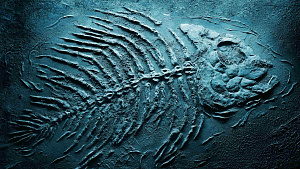Brazilian researchers from the Rio de Janeiro State University and the National Museum of the Federal University of Rio de Janeiro have identified a new species of prehistoric fish in the Antarctic Peninsula. This is reported by
Agencia Brasil.
The find, published this week, concerns an exceptionally well-preserved articulated fossil named Antarctichthys longipectoralis, which lived between 145 and 66 million years ago during the Cretaceous period.
The research took five years, from the fossil’s arrival in Brazil to its three-dimensional reconstruction. Using micro-CT scanning, similar to a medical CT scan, the team produced over 2,000 high-resolution tomographic “slices” without damaging the specimen, enabling them to digitally model the fish as it would have appeared in the Cretaceous.
Measuring between 8 and 10 centimetres, Antarctichthys had a long head, slender body and small neural spines.
According to zoology professor Valeria Gallo, Antarctica, though little explored by palaeontology, holds crucial clues to the evolution of life in the southern hemisphere and to historical links that shaped present-day biodiversity.
Photo:
liubomirt / iStock
